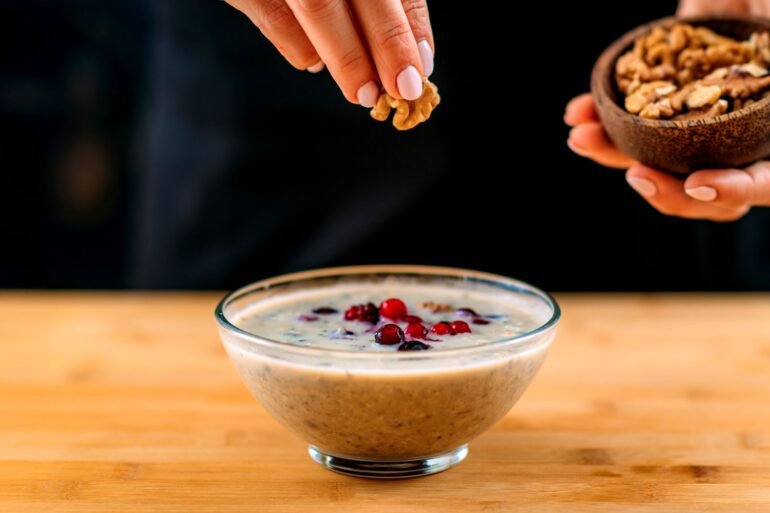:max_bytes(150000):strip_icc():format(jpeg)/Walnut-Rich-Breakfast-for-Cognitive-Health-FT-DGTL1025-60149f7d86c44393bd863280bd0546cc.jpg)
- A University of Reading study found that eating walnuts with breakfast improved young adults’ reaction times and memory throughout the day compared to those who skipped the nuts.
- Walnuts stand out for brain health thanks to their high levels of omega-3 fatty acids, polyphenols, and antioxidants, which reduce inflammation and oxidative stress linked to cognitive decline.
- Experts recommend about 1.5 ounces—or seven to 11 whole walnuts—each morning to support focus, memory, and overall cognitive function, ideally as part of a balanced breakfast.
Love it or hate it, there’s a reason people say breakfast is the most important meal of the day — it fuels your body with the essential nutrients it needs to prepare for a busy day. Eggs, toast, and oatmeal are all great options, but recent research out of the University of Reading in the United Kingdom found that walnuts might be the breakfast superfood your mind needs to function at its best.
The study followed 32 young adults (aged 18 to 30) who ate two different breakfasts: one with walnuts and one without. Over the next six hours, researchers administered three cognitive tests to each participant that monitored brain activity. The result? Those who ate walnuts with breakfast had faster reaction times throughout the day and better memory by the end of the testing period than those who did not.
That said, while there was a noticeable boost in cognitive performance, the study only looked at healthy young adults. Therefore, more research with a larger and more diverse sample, including older adults and individuals with health conditions, is needed, says Jennifer Bianchini, RD, a functional dietitian, mind-body wellness expert, and founder of Body to Soul Health. It’s also important to note that the study was funded by the California Walnut Commission. The researchers explicitly state that the funder played no role in the study’s design, execution, or interpretation, but for full transparency, this is worth mentioning.
Ready to dive into the exact mechanisms that give walnuts their brain-boosting power? Keep scrolling.
How do walnuts benefit cognitive health?
Among nuts, walnuts stand out as the best choice for supporting brain health and preventing dementia because they are one of the few tree nuts rich in omega-3s (specifically alpha-linolenic acid), polyphenols, and antioxidants. These compounds help reduce inflammation and oxidative stress — a state where free radicals outnumber antioxidants, leading to cell damage — two major factors in cognitive decline, says Christina Ni, MD, a board-certified psychiatrist and interventional psychiatry medical director with Mindpath Health.
The nut also contains a wide range of flavonoids (plant pigments), which act as potent plant compounds that reduce brain inflammation, protect against cell damage, and enhance cognitive functions like memory and processing speed, says Ryan Sultan, MD, a double-board-certified psychiatrist and medical director at Integrative Psych of Manhattan. Studies support this, finding that a higher intake of flavonoid-rich foods is associated with a lower risk of cognitive decline and memory problems.
Additionally, research shows that walnuts can boost blood flow to the brain, support brain cell activity and signaling, and improve neuroplasticity—the brain’s ability to repair itself. Ni credits these effects to improved cognitive function and protection against age-related mental decline.
Walnuts also contain the following brain-boosting nutrients, according to Ni.
- Vitamin E: An antioxidant that promotes the health and function of neurons (brain cells).
- B vitamins, including folate: A group of vitamins that support neuron function and lower amino acid levels (especially homocysteine) associated with cognitive decline.
- Melatonin: A hormone that regulates circadian rhythm and also guards against oxidative stress and brain cell damage.
- Polyunsaturated fats and protein: Nutrients that provide energy and beneficial fats that contribute to healthy brain cells.
“Essentially, these nutrients and compounds work together to promote healthy brain signaling and function, fuel energy, reduce inflammation, decrease oxidative stress, and increase blood flow, and together, they contribute toward neuroprotection (brain protection) which keeps the brain sharp, resilient, and well-nourished as people age,” Ni says.
Why are the cognitive benefits of walnuts greater when eaten in the morning?
In a fasted morning state, the brain is running on empty, so it mainly depends on its first supply of glucose (a simple sugar that serves as the body’s primary energy source). In this case, Sultan says, “The health benefits appear stronger when walnuts are consumed in the morning because they provide a steady supply of glucose instead of a spike and crash, and these delayed effects overlap with peak work and study hours midday.”
In other words, the body is prepared to absorb the most fuel in the morning. “The way the body digests walnuts is the same mechanism no matter the time of day, but the body responds differently depending on circadian rhythm, so in the morning, insulin sensitivity is higher, and the body is primed to use nutrients for energy and brain function,” Bianchini explains. “At night, the body is winding down and more likely to store nutrients rather than actively use them.”
Other nuts also have this “morning effect” when eaten for breakfast because they supply protein, healthy fats, and fiber, which can help you feel full; however, walnuts are exceptionally distinct because they contain higher levels of omega-3s and polyphenols than other nuts, making them a valuable resource for cognitive health, Bianchini says.
How many walnuts should you eat to reap these benefits?
According to the University of Reading study, consuming 50 grams (about 1.5 ounces) of walnuts daily improved cognitive performance and brain activity. Generally speaking, this translates to roughly seven to 11 whole walnuts, Ni says.
There’s no specific upper limit mentioned in this study, but Ni recommends not exceeding 2 ounces of walnuts per day (about 14 whole walnuts), as excess calories may outweigh the benefits. Walnuts are also high in fiber, so eating too many too quickly can cause digestive discomfort, such as bloating, cramping, or gas.
Additionally, those with a nut allergy should avoid walnuts completely, and anyone with pancreatitis or digestive issues may want to limit their intake, since high-fat foods like walnuts can worsen symptoms, Ni says. And although rare, people on blood-thinning medications should also talk to their doctor before eating walnuts regularly, because walnuts can increase the risk of bleeding when consumed in high quantities, she adds.
Consistency is key for maximum health benefits, so Ni recommends eating walnuts roughly five to seven times a week. It’s also better to choose raw, unsalted walnuts, as the added sodium and sugar in salted or candied options may outweigh the health benefits.
If you aren’t a fan of the taste or texture of raw walnuts, Dr. Ni suggests:
- Blending into your morning smoothie
- Sprinkling atop cereal, oatmeal, or yogurt
- Tossing into salads, pastas, vegetable dishes, pesto sauce, or stir-fry
- Pureeing into a homemade butter slathered on toast or pancakes
- Toasting with a dollop of honey and cinnamon for a sweet, yet savory dessert
What are the additional health benefits of walnuts?
Besides their potential benefits for brain health, walnuts support heart health by increasing healthy fats called HDL (good) cholesterol, which lowers LDL (bad) cholesterol, improves blood vessel function, and decreases the risk of cardiovascular disease. Given their antioxidant properties, walnuts also help prevent chronic diseases such as heart disease, cancer, and diabetes by neutralizing free radicals and preventing oxidative damage to cells, Ni explains.
Need more proof to stock up on the tree nut? Bianchini says walnuts have been shown to reduce inflammation throughout the body, which supports hormones, metabolism, and post-exercise recovery. They’re also known to promote gut health by supporting beneficial bacteria and short-chain fatty acids (byproducts of bacterial fermentation in the gut) during digestion, Sultan adds.
What other nuts benefit cognitive health?
Much like walnuts, research suggests the following nuts also improve cognitive health thanks to the nutrient matrix they provide.
- Pistachios
- Almonds
- Pecans
- Brazil nuts
- Cashews
- Hazelnuts
- Macadamias
- Pine nuts
- Peanuts
Andi Breitowich
2025-11-02 19:01:00

